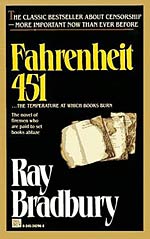
![]() couchtomoon
couchtomoon
8/1/2014
![]()
In 9th grade, I was assigned Fahrenheit 451 in English class. I don't think I ever made the connection that it was written by the same author who blew my mind in a group reading assignment in the 5th grade (I suspect the book was The Martian Chronicles). It was an assignment, which means everything about it was stored in my short-term memory– other than the moral of the story ("Don't burn books or you'll go crazy wondering what Shakespeare was on about"), and the sixties aesthetic of the perfunctory film viewing is burned on my memory forever. I don't even think we read the entire book.
So, I re-read Fahrenheit 451 recently. And you know what? Bradbury is a damn good writer. He nails mood, tone, and dialogue. He waxes poetic, but only when appropriate. He cuts big slabs of truth with knife-edge precision. It's a well-done story that's too good to be relegated to a 9th grade required reading list.
Guy Montag is a fireman, which means he burns books for a living. He is also harboring his own stash of contraband books, and his curiosity overwhelms him. Chance meetings with a strange neighborhood girl, and an old scholar, and his ever-distant relationship with his wife, cause him to question the rules that govern this unspecified future of the United States. He becomes the very thing he was hired to control– a dissenter and a threat to society.
Thanks to the latest eBook edition that's crammed with after notes from critics and scholars, I know that Bradbury succeeded as a writer because he was a reader. A voracious reader. A "skipped college and got his education at the library" kind of reader. Because of this, he gets the reader's plight: "The good writers touch life often. The mediocre ones run a quick hand over her. The bad ones rape her and leave her for the flies" (p. 79). Dude, I know your pain. I've read those writers. Sometimes, they win Hugos.
And a good book? "This book has pores. It has features. This book can go under the microscope. You'd find life under the glass, streaming past in infinite profusion" (p. 79). Those are the books that give me the shivers, fill me with wonder, and cast light upon my reality.
In Fahrenheit 451, Bradbury warns of a future he sees on the horizon, and even made it to his nightmare future, having died just a couple of years ago. The central theme of 451 isn't quite a forecast—firefighters still focus on burning houses and cats in trees—but many peripheral elements are eerily prophesied. Not the law-mandated book burnings, mind you, but the reality TV on wall-sized screens, portable tablets, and people constantly plugged in with in-ear shells (earbuds!).Fahrenheit 451 is a glimpse into a world of cheap information and entertainment overload… and here we are.
People still ban books– and even burn them in my part of the country– and most water cooler talk centers on the best dancing B-celebrity, and which himbo the Bachelorette should pick. Oh, sure, I like to read and talk about books, but I only talk about them through an anonymous networked screen. I wonder what Ray would think about that.
Unfortunately, Fahrenheit 451 also contains some of the hallmarks of the fifties' worst fiction. Bradbury's female characters are annoying airheads who only cause problems. His action sequences are sometimes forced, jumbled, and inconsistent. The protagonist is an alpha male whose problem-solving techniques involve yelling direct orders and taking direct action. But Bradbury balances these problems with delicate prose and provocative intrapersonal conflict. He takes us into the heart of Guy's madness, and we see the madness of our world.
Listen to your English teacher, kids. Fahrenheit 451 deserves its place as a classic genre representative among the Literary greats.
http://couchtomoon.wordpress.com